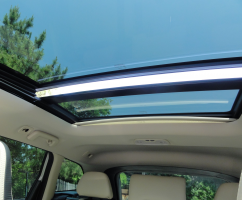
— A Volvo sunroof leak lawsuit is still seeking class action certification more than 10 years after the lawsuit was filed.
The Volvo sunroof leak lawsuit includes any person who between April 29, 2004, and December 31, 2015, purchased or leased any of the following vehicles from a Volvo dealership in California, Florida, Massachusetts or New Jersey and also resided in one of those states at the time of that purchase or lease.
- Volvo S40
- Volvo S60
- Volvo S80
- Volvo V70
- Volvo V50
- Volvo XC90
The sunroof lawsuit alleges the vehicles are defective because water leaks into the cabins and damages electronics, carpets and other parts of the interiors. The main argument is drainage tubes and holes get clogged by debris which routes the water into the vehicles.
Some Volvo owners claim they spent hundreds of dollars to repair the damage from leaking sunroofs even when the vehicles were under their warranties.
The Volvo sunroof leak lawsuit was originally filed on behalf of owners nationwide, but the current version includes Volvo customers in the four states named above.
Volvo's Motion to Deny Class Action Certification
Volvo argues the plaintiffs have filed at least five motions for class action certification since 2012 and allegedly still have been unable to show a class or subclass can be certified. The automaker also says the plaintiffs several times have changed their description of what defines a class of customers.
In this fifth motion to certify the lawsuit, the plaintiffs seek to certify two subclass in the four states. The first subclass makes up current owners who purchased the affected vehicles from Volvo dealerships and who still own the vehicles.
The second subclass consists of current and former Volvo owners in the four states who experienced a sunoof leak and can offer proof they incurred out-of-pocket expenses for repairs.
But Volvo says the plaintiffs cannot establish the required numerosity because membership is determined at some future point in time, which is the date when the lawsuit would be certified as a class suit.
"Plaintiffs have offered no evidence from which the Court could reasonably determine the number of putative class vehicles that might be included in the proposed subclasses as of some future date when the Court rules on Plaintiffs’ latest class certification motion." — Volvo
After this many years in court, two of the plaintiffs allegedly no longer own their Volvo vehicles. Volvo argues this means the plaintiffs have no current owner class representatives for California and Florida.
Volvo also points to an expert hired by the plaintiffs, and the automaker says the expert admits his analysis cannot be used to identify anyone who experienced a water leak from the sunroof in their vehicle. Nor is he aware of any database that would identify those who did.
The automaker further says nothing in the expert's testimony provides any information that could be used to identify the number of people who experienced a sunroof water leak and incurred prior out-of-pocket expenses related to sunroof leaks.
Even if a sunroof did leak at some point, the water leak allegedly doesn't mean an owner paid out-of-pocket for repairs. And to find out who may have paid is allegedly not possible because the plaintiffs haven't provided a way to learn how to do it.
According to Volvo, "even if a putative class member experienced a water leak and repaired the vehicle, some vehicles may have been repaired under warranty or at no cost as goodwill by Volvo."
Volvo previously argued possibly 0.5% of the vehicles may suffer from leaking sunroofs, but the automaker also says the plaintiffs don't provide any evidence those 0.5% of owners who purchased from a Volvo dealer experienced a sunroof leak and paid their own money for repairs.
According to Volvo, the lawsuit was filed more than 10 years ago and the oldest affected Volvo vehicles are now 17 years old.
Additionally, it's likely many vehicles will be sold or scrapped in the next year, leaving the plaintiffs unable to show how many vehicles would even be involved in the proposed class action.
In its motion to deny class certification, Volvo argues the plaintiffs cannot prove unlawful conduct with common evidence because the allegedly defective sunroof sound traps at issue differ and have different risks of clogging. And the plaintiffs allegedly cannot prove a loss or damages with common evidence.
"[T]he overwhelming majority of vehicles in the class never experienced a clogged sunroof drain or water leak, and Plaintiffs’ expert’s testimony admittedly does not support the diminished value theory on which they rely for an ascertainable loss and damages." — Volvo
Additionally, Volvo alleges the plaintiffs cannot prove causation with common evidence.
The Volvo sunroof leak lawsuit was filed in the U.S. District Court for the District of New Jersey - Neale, et al. v. Volvo Cars of North America LLC, et al.
The plaintiffs are represented by Chimicles & Tikellis LLP, McCuneWright LLP, Lite DePalma Greenberg, and Mazie Slater Katz & Freeman LLC.




